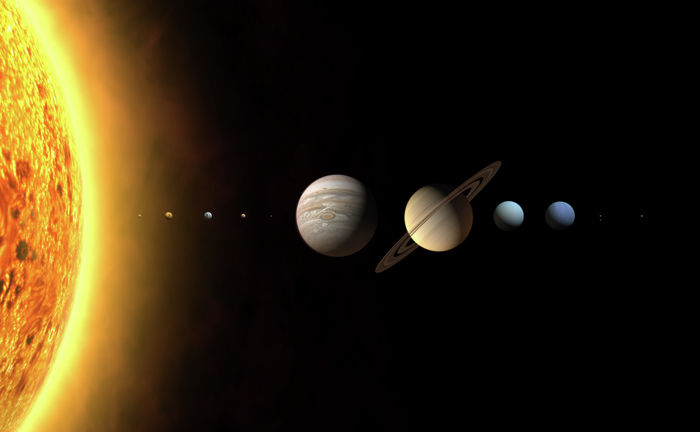The end of the world as we know it!
Teymour Taj explores some of the weird and wonderful theories predicting the end of life on Earth

Perhaps you have been contemplating life after reading some existentialist philosophy, or the winter blues have just been hitting hard. Either way, let’s explore some of the theories predicting how the world will end. I will be ignoring man-made disasters such as a devastating nuclear winter or AI uprising, and focusing on the potential cosmological reasons for our demise.
Runaway greenhouse effect
Billions of years ago, our nearest neighbour Venus may have been similar to early Earth, with huge oceans of liquid water and clear skies. However, as the sun aged it grew brighter, causing these oceans to start boiling off. The water vapour then acted like a blanket, trapping heat in Venus’s atmosphere and causing further warming. Once the oceans had fully dried up, the water which had once lubricated Venus’s tectonic plates was gone. The motion of the plates stopped, and carbon which would have been stored deep inside the planets by this process was instead released into the atmosphere, heating the planet even more. The result is a red-hot planet with a surface temperature of about 400°C, and clouds of sulfuric acid in the sky.
“The Earth’s orbit will also shrink due to frictional forces, causing it to be engulfed by the Sun”
The good news is that most planetary scientists do not believe that man-made greenhouse gas emissions could cause a runaway greenhouse effect, even in the most pessimistic scenarios. However, the bad news is that the Sun is still getting brighter as it ages, so in a few hundred million years we may be headed for the same fate as our sister planet.
Eaten up by the Sun
If we somehow survive the runaway greenhouse effect, then in about 5 billion years, the Sun will run out of its supply of hydrogen in its core, which it uses to power itself in the process of nuclear fusion. Instead, the remaining hydrogen in the outer layers of the Sun will begin to undergo nuclear fusion, causing the sun to balloon to 256 times its current size, and get much brighter. The Earth’s orbit will also shrink due to frictional forces, causing it to be engulfed by the Sun in 7.6 billion years.
The Big Freeze
If we have miraculously avoided a fiery fate in the depths of the Sun, let’s assume we will be OK until the eventual end of the entire Universe. The 'Big Freeze' hypothesis, also known as the heat death of the Universe, predicts that the Universe will eventual come to a complete standstill, as a randomly distributed soup of matter.
This theory comes from our observation that the Universe is continually expanding, as well as the laws of thermodynamics. Think about making a sandcastle: in order to arrange the grains of sand into the required shape, you need to put in energy. However, once you leave your sandcastle alone, the wind and the waves randomly arrange the grains. The tendency of the sand to return to the random arrangement is just a consequence of the fact that there are uncountably many more sand arrangements that look like random blobs than look like sandcastles.
The strength of gravity and other forces of nature decrease as the particles get further apart, and eventually they are not enough to overcome the tendency of particles to move randomly. This random motion will all be converted into heat as particles collide with each other, and the Universe will just be made up of still, lonely particles, cooling down for eternity.
The Big Slurp
One of the less-accepted but perhaps more interesting hypotheses is the ‘Big Slurp’. This relies on the understanding of the Higgs field, a force field which permeates the whole Universe and hosts the famous Higgs boson. For space to be stable, the energy of the Higgs field must be at its lowest possible value in the vacuum of space.
“If there exists a lower possible energy, the whole Universe could drop in energy through a quantum effect”
However, if there exists a lower possible energy, the whole Universe could drop in energy through a quantum effect. If this happens, all bets are off. Some say the values of fundamental constants such as the gravitational constant would change, making gravity a much stronger force and triggering the collapse of the Universe, or even destroying all matter in the Universe.
Luckily, these phenomena are many millions of years away, so you can rest easy knowing your fate is in the hands of humans, not the Universe! Oh, wait…
 News / Eight Cambridge researchers awarded €17m in ERC research grants27 December 2025
News / Eight Cambridge researchers awarded €17m in ERC research grants27 December 2025 News / Downing investigates ‘mysterious’ underground burial vault 29 December 2025
News / Downing investigates ‘mysterious’ underground burial vault 29 December 2025 Lifestyle / Ask Auntie Alice29 December 2025
Lifestyle / Ask Auntie Alice29 December 2025 Sport / Hard work, heartbreak and hope: international gymnast Maddie Marshall’s journey 29 December 2025
Sport / Hard work, heartbreak and hope: international gymnast Maddie Marshall’s journey 29 December 2025 Interviews / Meet Juan Michel, Cambridge’s multilingual musician29 December 2025
Interviews / Meet Juan Michel, Cambridge’s multilingual musician29 December 2025










